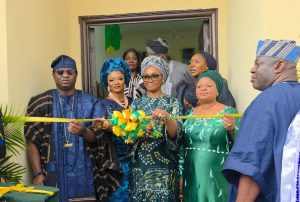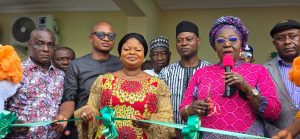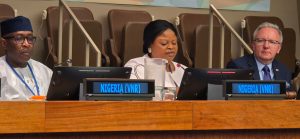KEYNOTE ADDRESS DELIVERED BY
THE SENIOR SPECIAL ASSISTANT TO THE PRESIDENT ON SDGs
HER EXCELLENCE PRINCESS ADEJOKE ORELOPE-ADEFULIRE
AT THE
ONE-DAY WORKSHOP ON THE ROLE OF STATE HOUSES OF ASSEMBLY IN THE IMPLEMENTATION/ACHIEVEMENT OF THE SDGs FOR MEMBERS OF THE BENUE STATE HOUSE OF ASSEMBLY
HELD AT
THE BANQUET HALL, BENUE HOTELS, MAKURDI
ON TUESDAY, 28TH NOVEMBER 2017
I feel very honored to make a few remarks at this important event organized to deliberate with the Benue State House of Assembly on the imperative of fast-tracking the implementation of the Sustainable Development Goals (SDGs) in Nigeria. I feel quite at home here as I consider myself fortunate to have this opportunity to interact with Members of the State House of Assembly having served for years in the Lagos State House of Assembly myself. I am thus at home with my kith and kin!
Before I proceed, permit me to extend my deep appreciation to my brothers, Their Excellencies, Dr. Samuel Ortom, Executive Governor of Benue State and Mr. Edward Kallon, United Nation (UN) Resident Coordinator and UN Development Programme (UNDP) Resident Representative in Nigeria. I am thankful for this unique collaboration forged to accelerate the implementation of the SDGs especially at the sub-national level in Nigeria.
As you are aware, the global community is in the second year of the implementation of the SDGs Agenda. You will recall that Heads of State and Government of UN Member States adopted the 2030 Agenda at the 2015 United Nations General Assembly in New York. The SDGs Declaration affirmed by Heads of Government, including our dear President, Muhammadu Buhari, GCFR, lays out a set of 17 Goals, 169 Targets and 232 Indicators. These Goals are expected to shift the world into an inclusive sustainable development path, leaving no one behind in the process.
In accordance with the commitment made by His Excellency the President, the Federal Government has worked assiduously to establish the policy, institutional and financial mechanisms needed for the attainment of the SDGs in Nigeria. In its coordinator role, the SDGs Office has undertaken a number of activities to provide strategic direction and impetus to the national commitment on the SDGs. These include but are not limited to:
- Development and dissemination of the MDGs End-Point Report in collaboration with the UNDP, DFID, MDAs and other stakeholders;
- Development of the Country Transition Strategy to the SDGs;
- Development of Action Plan to guide SDGs implementation;
- Roll out of SDGs Needs Assessment and Costing Exercise in partnership with the Ministry of Budget and National Planning, other MDAs as well as the UNDP;
- Data Mapping and determination of 126 Baseline SDGs Indicators to benchmark progress through partnership with the National Bureau of Statistics;
- Partnership Agreement with the UNDP to mainstream the SDGs at both the national and sub-national levels;
- Establishment of institutional mechanisms such as the Presidential Council on SDGs, Inter-Ministerial Committee for MDAs coordination and a sub-national partnership framework through the Conditional Grants Scheme; and
- Multi-stakeholder engagement mechanisms such as the Private Sector Advisory Group, Donors’ Partnership Forum on SDGs, Civil Society Strategy Group on SDGs, among others.
- Mobilization of influencers such as SDGs Ambassadors and SDGs Champions for advocacy and sensitization.
Excellencies, the attainment of the SDGs is contingent on diverse stakeholders acting in concert with multi-level and cross-sector partnerships deployed for success. The 2030 Agenda was conceived with the need for consensus building and synergies among policy makers and those implementing in mind.
The exigencies of our time require that we urgently deepen collaboration between those who drive the development process at the sub-national and Federal levels. Such synergies are pivotal as Parliaments, Civil Society, international development partners and other stakeholders ensure that Government and society at large mainstream, integrate and domesticate Internationally Agreed Development Goals (IADGs), including the SDGs, in order to improve the lives of our people.
Distinguished Parliamentarians, I would like to seize this auspicious moment to highlight the important place you occupy and the utility you bring to the development process. In developing countries, legislative bodies perform duties beyond traditional law making and take on broader roles which make parliamentarians major actors in development planning and execution. Apart from appropriating financial resources for development, policy and resource oversight and serving as voices for their poor and marginalised constituents, lawmakers have been documented to promote partnerships with state and non-state actors for the entrenchment of equity, inclusion, human rights and dignity for the people they represent.
In the vantage position I occupy as the Senior Special Assistant to the President on SDGs, I have found that collaboration with the National Assembly and State Parliaments is crucial for success. For instance, the National Assembly has played key roles in Nigeria not only in crafting the SDGs Agenda but also in ensuring progress towards its attainment. Nigeria’s National Assembly has provided the world with best practices in parliamentary engagement with the SDGs by establishing Standing Committees on the SDGs in both the Senate and the House of Representatives. Both committees are actively engaged in the implementation of the SDGs in Nigeria. It may interest you to note that Nigeria has at various instances chaired the African Network of Parliamentarians on the SDGs, a pan-African advocacy group facilitated by the United Nations.
Honourable Members, the successful implementation of the 2030 Agenda in Benue State requires grassroots acceptance as well as policies, laws and financial resources to effectively implement them. Early engagement in mainstreaming and prioritizing the goals, targets and indicators will elicit citizens’ confidence, buy-in and support in the implementation process. And as legitimate representatives of your people, you carry their voices, their needs and aspirations. You have the unique opportunity of bringing this to bear in development discussions within and outside Parliament.
One of the major discussions you must have is to ensure SDGs mainstreaming efforts take root in Benue State. Mainstreaming entails efforts aimed at integrating the SDGs into State, National and Sectoral development plans, policies and strategies. Successful mainstreaming also requires that the SDGs Agenda be aligned with budgeting frameworks and cycles. In addition, mainstreaming also encompass SDGs sensitization and advocacy, not only in major cities such as Makurdi but every nook and cranny of the State.
At the National level, the SDGs have been integrated into the Medium Term Planning Framework known as the National Economic Recovery and Growth Plan (NERGP). Core SDGs areas such as poverty eradication, macroeconomic stability and inclusive growth, energy and infrastructural development, among others, have been integrated into the NERGP. The SDGs Office is now in collaboration with the Ministry of Budget and National Planning to ensure all of the SDGs are mainstreamed into the NERGP Implementation Plan currently being developed.
I am delighted to note that Benue State is one of the shining lights in SDGs mainstreaming across the Nation. I understand that the SDGs have been integrated into your State Development Plan. As a matter of fact, the example of Benue State was showcased as a best practice of SDGs domestication at a Side Event jointly organized by Benue State and the SDGs Office at the margins of the 2015 UN General Assembly in New York. It is heart-warming that you are translating this policy on paper to action on the ground with greater political and civic engagement.
Therefore, I would like to assure you that the SDGs Office is committed to the task of ensuring that you achieve your aim of bringing development dividends to your people through the SDGs framework. As it is being done here today, we hope to continue to inform Parliamentarians and other policymakers on current trends and emerging issues at national, regional and global levels, highlighting their implications on our people. In addition, we hope to continue to share regional and global experiences of parliamentary engagement with the SDGs and opportunities for Parliaments to engage with, including the Benue State House of Assembly. We also look forward to building consensus with you on the ways and means needed to attain the SDGs in Benue State. To achieve these lofty aspirations, we have entered into an arrangement with the UNDP where they will continue to render technical backstopping for development efforts both at the national and sub-national levels.
Once again, I express my gratitude to His Excellency, Mr. Edward Kallon and the Executive Governor of Benue State for this opportunity to work together for the good of our people. I am convinced that this unique partnership will contribute in no small way to our quest to attain the SDGs and leave no one behind.
I wish you all fruitful deliberations. Thank you.




